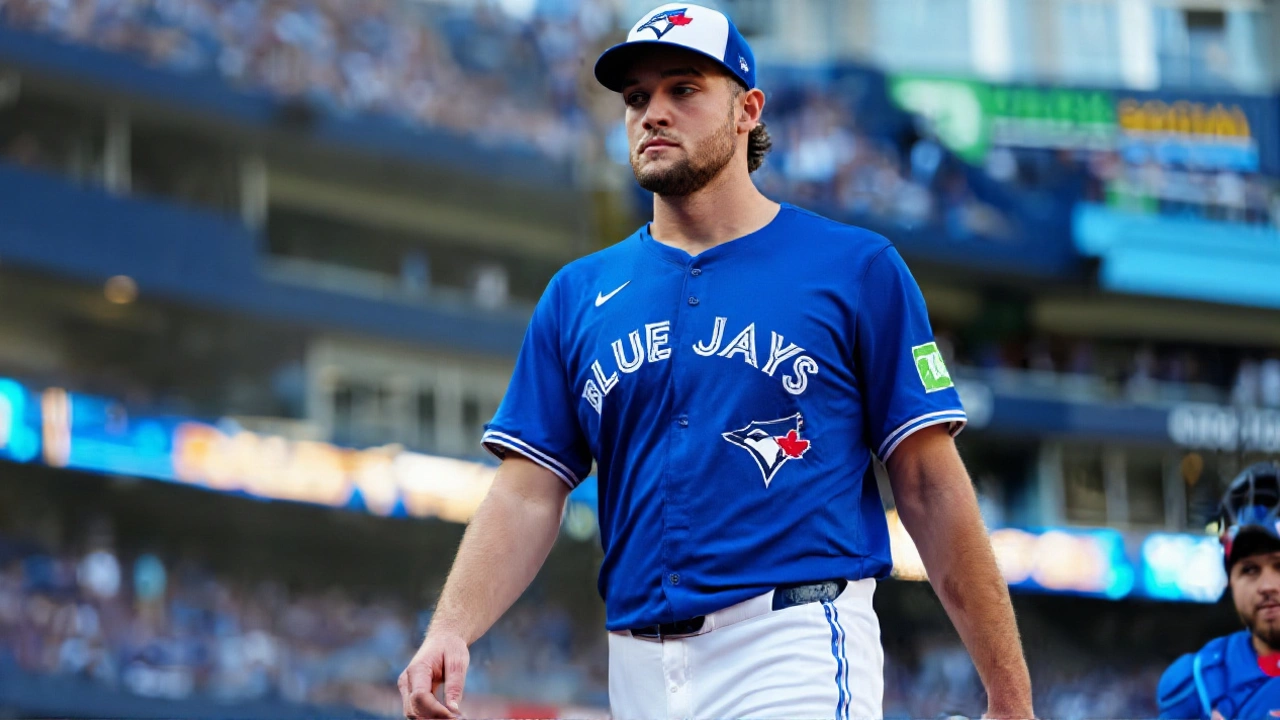When Trey Yesavage, the 22‑year‑old rookie starter for the Toronto Blue Jays, stepped up to the microphone at Rogers Centre on Sunday, October 12, 2025, the press conference turned into a surprising stand‑against digital hate.
It was 2:15 p.m. Eastern Time, hours before Game 1 of the American League Championship Series (ALCSToronto, Ontario). The Mariners were slated to be the Blue Jays' next opponent, but Yesavage had something else on his mind: the wave of online harassment aimed at his parents, brothers, and girlfriend after his franchise‑record postseason outing.
Background and Record‑Breaking Performance
Only a week earlier, on October 8, Yesavage had carved his name into the club’s postseason lore. Pitching at Yankee Stadium in the Bronx, the right‑hander threw 5 1/3 innings of near‑no‑hit baseball, fanning 11 batters. Toronto won 5‑1, knocking the New York Yankees out of the American League Division Series. The feat set a new Blue Jays postseason record for strikeouts in a single game.
Born in Raleigh, North Carolina, Yesavage honed his craft at East Carolina University before the Blue Jays drafted him 15th overall in the 2023 MLB Draft. He made his MLB debut on September 1, 2025, after a dramatic call‑up from the Buffalo Bisons—Toronto’s Triple‑A affiliate—where he chose to drive straight to the big league clubhouse rather than linger in the minors.
Pretalk Turned Protest: The Pre‑Game Press Conference
Yesavage didn’t wait for the standard ALCS questionnaire. He leaned into the mic and said, “Living in a world where there’s so many different opinions and feelings which result in a lot of hate, it’s sad to see that people close to me are being attacked for my performance on the field.” He went on to name his parents, brothers, and girlfriend as the unintended victims of the backlash.
“I know I have the platform to address it, so I am,” he added. “If you have a problem, I’m a man. I can take whatever opinions anybody has about me and my life.”
MLB.com reporter Keegan Matheson noted that Yesavage declined to cite specific platforms or posts, but the harassment was clearly not coming from Toronto fans. “The hate appears to be spilling over from Yankees supporters after they were eliminated,” Matheson wrote.
The Nature of the Harassment
- Targeted posts aimed at family members on major social networks.
- Anonymous messages accusing the pitcher’s relatives of “cheating” or “buying” the win.
- Threats of filing false complaints to the university where Yesavage studied.
While the exact volume of the abuse wasn’t disclosed, the emotional toll was evident. Yesavage’s teammates, including veteran left‑hander Jordan Romano, later whispered that the locker room was buzzing with concern for his family’s wellbeing.
Organizational Response
The Blue Jays organization, officially the Toronto Blue Jays Baseball Club Inc., has yet to issue a formal statement. General Manager Ross Atkins praised Yesavage earlier in September, calling him “the future centerpiece of our pitching staff.” However, when asked about the harassment, the team’s media liaison simply said they were “monitoring the situation.”
Pitching coach Casey Candaele recounted the rookie’s call‑up decision: three options—return to Buffalo, shut down his season, or drive straight to Toronto. Yesavage chose the last, arriving at 11:47 p.m. on August 31, 2025, and made his debut the next day.
Wider Implications in Sports Culture
What Yesavage highlighted isn’t new. Athletes across the league—from NFL quarterbacks to NBA rookies—have faced similar smear campaigns. Yet the conversation rarely includes the collateral damage to families. According to a 2024 Pew Research study, 62 % of athletes report that online harassment extends to relatives, but only 18 % feel their clubs offer adequate support.
Fans argue that free speech includes criticism, but the line blurs when personal attacks replace performance analysis. Sports psychologists note that such harassment can affect on‑field focus, elevate stress hormones, and even lead to decreased performance.
Looking Ahead: The ALCS and Beyond
The ALCS kicks off tonight, with the Blue Jays holding a 2‑0 series lead over the Seattle Mariners. Yesavage is slated to start Game 2 on Monday, October 13, at the same Rogers Centre. If he repeats his dominance, the spotlight—and the scrutiny—will only intensify.
Meanwhile, MLB’s Player Relations Department has promised a review of harassment policies, but concrete steps remain vague. The league’s senior vice president for media, Judy Lee, told reporters that “protecting players’ families is a priority, but we need clearer reporting mechanisms.”
Key Facts
- Who: Rookie pitcher Trey Yesavage
- What: Publicly addressed online harassment of his family
- When: October 12, 2025, 2:15 p.m. ET
- Where: Rogers Centre, Toronto
- Why it matters: Highlights growing issue of third‑party abuse in professional sports
Frequently Asked Questions
What exactly did Trey Yesavage say about the harassment?
Yesavage explained that his parents, brothers, and girlfriend were being attacked online because of his performance, noting that they "have done nothing to warrant this negativity" and urging fans to separate on‑field actions from personal lives.
Has the Blue Jays organization taken any action?
To date, the club has not released an official statement beyond monitoring the situation. General Manager Ross Atkins praised Yesavage’s talent earlier in the season but remains silent on the harassment issue.
Is this type of harassment common for MLB players?
Yes, it’s increasingly common. A 2024 Pew Research survey found that more than half of professional athletes experience online abuse that extends to family members, though few leagues have robust protective policies.
Will this issue affect Yesavage’s performance in the ALCS?
Psychologists warn that personal attacks can raise stress levels and impact focus. However, Yesavage’s recent statements suggest he’s determined to channel any negativity into motivation for Game 2 against the Mariners.
What steps is MLB taking to combat online harassment?
MLB’s Player Relations Department announced a review of its harassment policies in early 2025, but concrete measures—such as a dedicated reporting portal for family members—have yet to be implemented.

